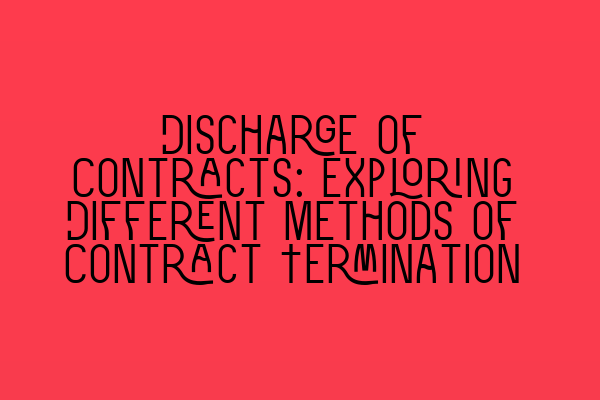Discharge of Contracts: Exploring Different Methods of Contract Termination
A contract is a legally binding agreement between two or more parties. It lays out the rights and obligations of each party involved. However, there may come a time when one or both parties want to terminate or end the contract. This is known as the discharge of a contract.
Discharging a contract can be a complex process, as it involves the termination of legal obligations and the resolution of any remaining contractual issues. In this blog post, we will explore the different methods of contract termination and provide insights into how each method works.
1. Performance
The most straightforward way to discharge a contract is through performance. If both parties fulfill their obligations as outlined in the contract, the contract is considered discharged. This means that both parties have completed their responsibilities and are no longer bound by the terms of the agreement.
For example, let’s say Party A agrees to sell a car to Party B. Party A delivers the car to Party B, and Party B pays the agreed-upon purchase price. In this case, the contract is discharged through performance.
Related Article: Mentorship for Aspiring Solicitors: Nurturing Talent in the Legal Field
2. Agreement
An agreement between the parties involved can also lead to the discharge of a contract. If both parties agree to terminate the contract before its completion, they can do so by mutual consent. This is often referred to as a contract cancellation or rescission.
It is important to note that an agreement to discharge a contract must be supported by new consideration. This means that both parties must receive something of value in exchange for terminating the contract. Otherwise, the agreement may not be legally enforceable.
Related Article: Legal Challenges and Pitfalls: Navigating the Complexities of the Legal System
3. Breach
When one party fails to fulfill their obligations as outlined in the contract, it is considered a breach of contract. A breach can occur when a party fails to perform on time, performs inadequately, or fails to perform at all.
When a breach occurs, the non-breaching party has the option to terminate the contract. They may seek damages to compensate for any losses suffered as a result of the breach. The termination of the contract due to a breach is known as a discharge by breach.
Related Article: The GDL (Graduate Diploma in Law): A Pathway to Becoming a Solicitor
4. Frustration
In certain circumstances, a contract may become impossible to perform due to an unforeseen event beyond the control of both parties. This is known as frustration. When a contract is frustrated, it is automatically discharged, and neither party is held liable for non-performance.
Frustration may occur in situations such as natural disasters, war, or the death or incapacity of a party crucial to the performance of the contract. The courts will assess whether the event leading to frustration was truly unforeseeable and whether it fundamentally changes the nature of the contract.
Related Article: Mastering the Solicitor’s Path: Prepare for the Journey Ahead
5. Renunciation
In some cases, one party may express an intention to no longer fulfill their obligations under the contract. This is known as renunciation or anticipatory breach. If the other party accepts this renunciation, the contract is discharged, and the injured party may seek damages for the anticipated breach.
However, if the injured party does not accept the renunciation and instead insists on performance, the contract remains in force, and the injured party can sue for damages once the breach occurs.
It is important to note that the injured party must act reasonably when deciding whether to accept or reject the renunciation. Unreasonable refusal to accept renunciation may result in a loss of rights to claim damages.
Related Article: The Benefits of Becoming a Solicitor: A Rewarding Career
Conclusion
The discharge of a contract is essential when parties want to terminate their legal obligations. Whether it is through performance, agreement, breach, frustration, or renunciation, each method of contract termination has its own implications and considerations.
Understanding the different methods of contract discharge is crucial for solicitors and individuals involved in legal agreements. By familiarizing themselves with these methods and consulting with legal professionals as needed, parties can navigate the complexities of contract termination and protect their rights and interests.
For more information on contract law, legal challenges, and the solicitor’s path, please explore our related articles:
- Mentorship for Aspiring Solicitors: Nurturing Talent in the Legal Field
- Legal Challenges and Pitfalls: Navigating the Complexities of the Legal System
- The GDL (Graduate Diploma in Law): A Pathway to Becoming a Solicitor
- Mastering the Solicitor’s Path: Prepare for the Journey Ahead
- The Benefits of Becoming a Solicitor: A Rewarding Career
